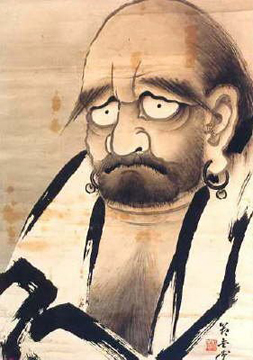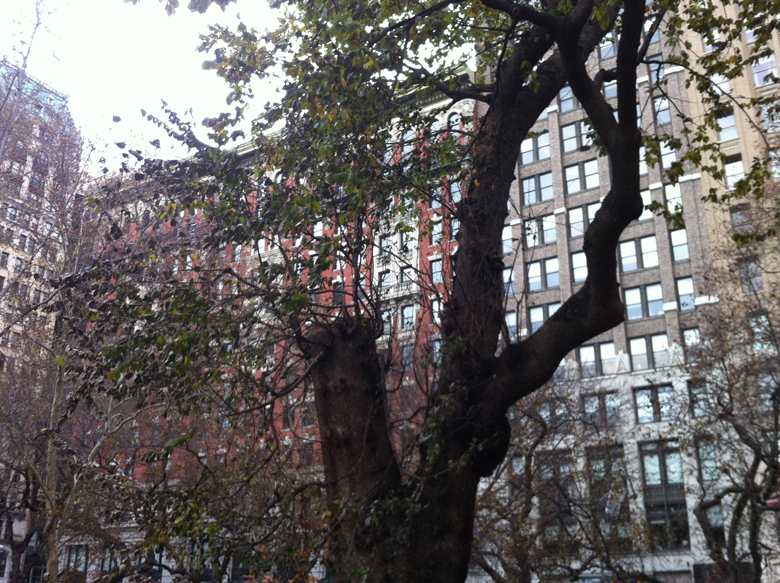XC
New yoga posture: inner dog
Imagination, so long identified with freedom and creative power is really a kind of cage; a mirrored cage of eidolons. Brother Writer, Sister Painter, therefore forsake imagination and allow what is beyond imagining to manifest.
A dog’s a dog for a’ that
“The bogeyman is unsustainable debt, say analysts.” John Aidan Byrne “The Debt Bomb,” in Post Business, New York Post, 3/22/15, p. 35.
A man passes you on Eighth Avenue, speaking, presumably, into a wire: “I know you did, you kinky bitch…”
Daruma doll: knock it over and it pops back up. Or, as the Japanese saying goes: “seven times down, eight times up.”
Daruma doll: modeled, so they say, after the Bodhidarma, after the twenty-eighth patriarch, after the founder of Zen and bringer of Chan to China.
Daruma doll: mostly round, no arms or legs. And red, the color of a high-ranking priest’s robe, blood, and all-round auspiciousness.
Eyebrows in the shape of a crane which everyone knows lives for a thousand years.
Cheek hair shaped like a tortoise, which everyone knows lives ten times as long as a crane.
Once, some say, his moustache and whiskers were shaped like a dragon, but no one knows how long dragons live, so the Daruma grew a tortoise beard.
Sometimes, Daruma – who, legend says fathered a hundred martial art – is depicted as a female prostitute. Round heels. Pops back up. Resilient. Satiric.
Daruma’s eyes: they’re missing. Ah that’s another story, or more of the same. And how he lost his limbs? Meditated them off.
Intention and completion. That’s how they use Daruma most times. By the thousand. And burn him after a year. By the hundred thousand.
Then buy a new one: paint in a pupil for that which you intend. Another when your goal’s accomplished.
Daruma – god of measles and smallpox! And his doll’s a charm for recovery from all illness, in wood or papier-mâché.
Some say Daruma doll came from China. There he was called 不倒翁 Budaoweng, or, “not-falling-down old man.”
Once! twice! [knocked over]
Ever the red-hooded Daruma
Heedlessly sits up again!
Or, more recently, via Donovan Leitch:
Histories of ages past
Unenlightened shadows cast
Down through all eternity
The crying of humanity
It is then when the Hurdy Gurdy Man
Comes singing songs of love
Then when the Hurdy Gurdy Man
Comes singing songs of love…
Hurdy gurdy, hurdy gurdy, hurdy gurdy, gurdy, he sang
Here comes the Roly Poly Man and he’s singing songs of love
Roly poly, roly poly, roly poly, poly, he sang
Hurdy gurdy, hurdy gurdy, hurdy gurdy, gurdy, he sang
Hurdy gurdy, hurdy gurdy, hurdy gurdy, gurdy, he sang…
Or Chumbawamba:
I get knocked down
But I get up again
You’re never going to keep me down…
Bowled over for dollars
Hit him and he springs back.
In the face of spectacle, Daruma keeps looking at his wall.
The Chinese, who call him Damo, say this, more or less, is what he said:
Buddhas don’t save Buddhas.
If you use your mind to look for a Buddha, you won’t see the Buddha.
As long as you look for a Buddha somewhere else,
You’ll never see that your own mind is the Buddha.
Don’t use a Buddha to worship a Buddha.
And don’t use the mind to invoke a Buddha.
Buddhas don’t recite sutras.
Buddhas don’t keep precepts.
And Buddhas don’t break precepts.
Buddhas don’t keep or break anything.
Buddhas don’t do good or evil.
To find a Buddha, you have to see your nature.

Beneath the headline, the mug, and the subhead, the copy reads:
Mitchell Cashewll, New York City Power Broker. “My greatest moment in real estate was my first sale. The client had interviewed fifteen different brokers and I told him I was just a rookie and this would be my first sale. I promised my all. Appreciating the honesty, he chose me. I can clearly remember the smile on his face when I handed him the key to his new home. Fast forward twelve years and I have had the honor of seeing that result, that smile, time and again.
TOWN Residential.
Is a picture you take of your nose a smellfie?
BVD = Bourgeois Values, Dude.
There is a relationship between organ structure and function and the forms in Ba Gua Zhang and, of course, in all manifestations of movement and stillness. Peristalsis, for example involves winding, spiraling, compression and release along the whole chain. Everything moves, but it moves in a smooth and uninterrupted flow according to its own “sovereign” manner and in cooperation with the other “sovereign” natures in the body.
The breath is the initiating sovereign. How many structures: organs, muscles, bones, ligaments, fascia, blood vessels go along for the diaphragmic ride?
Even Western anatomy will allow that the kidneys, for instance, pulled by structural attachments rise and fall, move apart and toward one another, measurably and perceptibly with each cycle of inhalation-exhalation. Not to mention that one can feel their motion with one’s own hands placed on the lower back, and, eventually, by interioception alone.
Wherefore, take your freedom where you may.
Have you noticed how, with only a slight change of inflection, worship sounds like warship; amen like I’m in…?
Chain chain chain,
Chain chain chain,
Chain chain cha-a-a-a-ain,
Chain of syllogisms
You are so-rites!
I was a Leopard Man for the FBI.
The Mexican War was the continuation of the Louisiana Purchase by other means.
Drones are an afterthought
More empathy than you can shake a stick at
Drones and butter
Flowers of the falling wall
What does West Point really mean?
Fear of forests is embedded in history. We have long regarded them as less a resource than a threat, the dark refuge of the unwanted, the unassimilated, and the dangerously unpredictable: the outlaw, the religious misfit, the barbarian, the guerrilla. Stay out of the deep woods, fairy tales caution us, and even in this urbanized age the message haunts our earliest memories. Military men have always treated forests as obstacles to conquest, where concealment, ambush, and confusion are the norm, and the biggest battalions do not necessarily prevail. Soldiers, more than anyone, can tell the frightening woods from the trees.
The archetypal woodlands smashup has to be the Battle of Teutoberg Forest in A.D. 9, which saw Germanic tribesmen ambush and annihilate three entire roman legions… For the Romans, never easy with the wilds, which defied their patented brand of imperial homogenization, Teutoburg was a nightmare; four centuries before the worst actually happened to them, they fantasized a barbarian descent on their domesticated countryside and capital – from the forest.
But clever generals have turned opponents’ aversion to forests into force equalizers and surprise multipliers. Napoleon sent columns through the supposedly impassable Franconian Forest to smash the Prussians at Jena in 1806, a poly that Stonewall Jackson and Heinz Guderian replayed with stunning effect at Chancellorsville and the Ardennes, respectively. Other generals have made, saved, or kept their reputations by avoiding forests or blocking the accesses through them. In 1792 the interposing presence of the Argonne Forest… determined where another crucial battle, Valmy, would be fought – the same Argonne that stymied the Germans in 1914 and nearly did the same to the Americans four years later.
If a forest can’t be put to advantage, it is best left alone. Occasionally, deep-seated fears do make sense. From the Wilderness to Hürtgen Forest to the jungles of Vietnam, forests have provided us with some of the least edifying chapters in our military history, and some of the most terrifying. I’m reminded of the line from David Jones’s long narrative poem about his experiences in the First World War, In Parenthesis: “To groves always men come both to their joy and their undoing.” [The writer goes on to speak of deforestation and its military consequences, and Colbert’s lament: “France will perish for lack of wood.”] Places like Picardy, where once-dense woodlands were giving way to agriculture, embodied his apprehension. Curiously, the scattered groves that remain there would attract action like magnets during the Battle of the Somme in 1916. Yeas ago I wandered into one of them, Mametz Wood, where David Jones had been wounded. Stepping around old shell holes as I tried to follow what he called its “mazy charnel ways,” I came upon an abandoned one-room hunting lodge, its tile roof beginning to collapse. One the door was a rough-lettered invitation that Hansel and Gretel’s witch would have appreciated: “Entre Sans Sonner,” it read – “Enter without ringing.” [from Robert Cowley, “A Note to Our Readers,” The Quarterly Journal of Military History. Vol. 5, No. 1, Autumn 1992.]
Also see: St. Boniface and the Donar Oak (BWC I), and earlier still, Erysichthon, King of Thessaly who hacked down Demeter’s grove (Ovid, Metamorphoses, VIII, 1042) and reaped the consequences.
It is worth noting that in Cowley’s short disquisition on the strategic uses and consequences of deforestation he omits mention of Operation Ranch Hand, the U.S. military’s ten year (1961-1971) program to chemically eradicate forests in Vietnam – the basic formula for “Agent Orange,” having been concocted at the University of Chicago during WWII. And to this day, Vietnam stands just behind Nigeria in rate of primary forest deforestation. But then, as the Zhuangzi notes, in any discussion, some things go undiscussed. And as ever, howerver long the arc, Burnham woods has a funny, even weird, way of moving, inexorably, toward Dunsinane.
And you, and I. What are we but walking trees?
And Macbeth.
Yi bu yi. Intention without intention.




